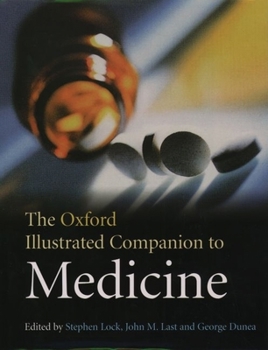The Oxford Illustrated Companion to Medicine
Boasting over five hundred illustrations, The Oxford Illustrated Companion to Medicine offers a stimulating, kaleidoscopic account of the current state and past history of the medical, nursing, and allied health sciences.
From alchemy to AIDS, and from snakebite to ultrasound, this wide-ranging reference travels both the main avenues and fascinating byways of medicine. Deftly written articles, penned by some 200 respected scholars, examine everything of importance--related sciences (such as biochemistry and cell biology), important institutions (medical colleges, societies, major hospitals, and libraries), modern medical techniques (such as magnetic resonance imaging), even the darker side of medicine, including fraud and misconduct in medical research, and medical cults and quackery. There are major entries on each of the branches of medicine, such as cardiology, pediatrics, and general surgery, describing what they encompass, their historical background, variations in international practice, and recent advances. And there are shorter entries that illuminate a comprehensive selection of medical terms. The volume also features a micropedia containing brief, insightful accounts of the lives and achievements of many fascinating and famous historical and contemporary medical personalities. And the Companion includes numerous articles that examine the often-close links between medicine and art, music, poetry, and dance.
This book is the perfect companion for everyone working in medicine or related fields, and everyone interested in the medical arts.
From alchemy to AIDS, and from snakebite to ultrasound, this wide-ranging reference travels both the main avenues and fascinating byways of medicine. Deftly written articles, penned by some 200 respected scholars, examine everything of importance--related sciences (such as biochemistry and cell biology), important institutions (medical colleges, societies, major hospitals, and libraries), modern medical techniques (such as magnetic resonance imaging), even the darker side of medicine, including fraud and misconduct in medical research, and medical cults and quackery. There are major entries on each of the branches of medicine, such as cardiology, pediatrics, and general surgery, describing what they encompass, their historical background, variations in international practice, and recent advances. And there are shorter entries that illuminate a comprehensive selection of medical terms. The volume also features a micropedia containing brief, insightful accounts of the lives and achievements of many fascinating and famous historical and contemporary medical personalities. And the Companion includes numerous articles that examine the often-close links between medicine and art, music, poetry, and dance.
This book is the perfect companion for everyone working in medicine or related fields, and everyone interested in the medical arts.
Format:Hardcover
Language:English
ISBN:0192629506
ISBN13:9780192629500
Release Date:December 2001
Publisher:Oxford University Press, USA
Length:924 Pages
Weight:4.50 lbs.
Dimensions:1.9" x 7.8" x 10.0"
Customer Reviews
2 ratings
an entertaining look at medicine
Published by Thriftbooks.com User , 18 years ago
it is not a encyclopedia in the traditional description. it is more of a leisure read,concerning medical topics. with the expected diseases and historical figures, come the little quirks;the elephant man, zombies and midwifes. the index makes finding specifics difficult, but if you're looking for fun and weird facts to scare your friends, then this is the book for you.
Oxford Illustrated Companion to Medicine
Published by Thriftbooks.com User , 23 years ago
This book is dedicated to sir Ronald Bodley Scott (1906-1982), a family physician and specialist in internal medicine, who was affiliated with St Bartholomew's Hospital and appointed physician to King George VI and Queen Elisabeth II. Together with a collegue he conceived the idea of this companion, which was in its planning stage at the time of his death. The present companion is the 3rd edition. The three editors are wellknown physicians, Stephen Lock, a hematologist who edited the British Medical Journal from 1975-91, John M Last professor emeritus in epidemiology from the Univesrity of Ottawa and George Dunea, the chairman of nephrology at Cook County Hospital in Chicago. This companion is not a standard encyclopedia, but rather a selection of more than 500 short papers by more than 200 authors on subjects from abortion to zombification. Each entry is connected to the historical perspective of medicine, relationship with culture or art and information on the persons behind. It can be learned that autopsies are not without side effects. A certain Josef Kolletschka died of sepsis following an infection acquired after sustaining a wound during autopsy. It was the similarity of his illness and in patients with puerperal fever that led Ignaz Philip Semmelweiss (1818-65) to understand that puerperal fever was caused by infection. This Hungarian obstetrician, working at the Allgemeines Krankenhaus in Vienna observed that the maternal mortality was higher in the ward attended by students (that came directly from the dissection room to the ward) than in the ward attended by nurses. When he enforced hygiene the mortality fell from 9.95% to 1.3%. The administration did not like his ideas and he was forced to leave for Budapest, where he became professor of obstetrics in 1855. His ideas on hygiene (Die Aetiologie der Begriff und die Prophylaxis des Kindbettfiebers, 1861) was not received well and in 1865 he suffered from an mental breakdown and died from septicemia from a wound infection. On the lighter side you will also find some nice quotations on the medical profession, like the one of Thomas Fuller (1609-61) on "physicians, who like beer, are best when they are old". All in all, a book with a wealth of information on medicine and its history.Professor Joav Merrick, MDMedical director, Division for Mental Retardation, Box 1260, IL-91012 Jerusalem, Israel, Mohammed Morad, MDFamily physician, Division for Community Health,






